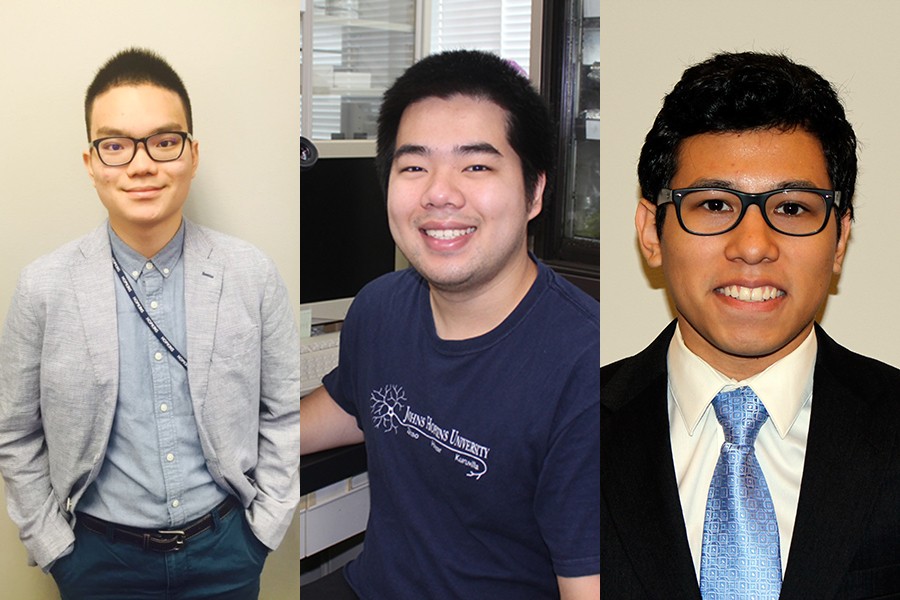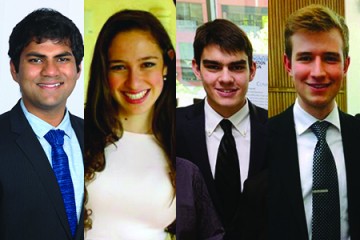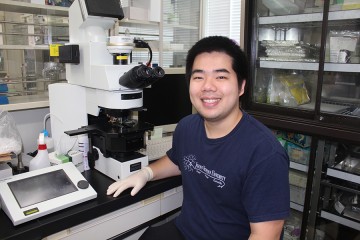Three Johns Hopkins juniors who have demonstrated outstanding promise in research careers have been recognized by the national Goldwater Scholarship program.
Alfred Chin, Duy Phan, and Fernando Vicente Zegarra were named Goldwater Scholars. A fourth Johns Hopkins student, Darius Mostaghimi, received honorable mention recognition.
Established in 1986, the Goldwater Scholarship was one of the first significant national scholarships focusing on STEM fields (science, technology, engineering, and math). Winners are nominated by their schools and selected for their academic merit. This year, 250 scholarships were awarded to students from an applicant pool of 1,286.
The program awards winners $7,500 to apply toward tuition, fees, books, and room and board. The national recognition has also been known to give students a competitive edge when pursuing graduate fellowships in their fields.
The four Johns Hopkins students recognized this year are:
Alfred C. Chin, a neuroscience and biophysics double major. He has worked in the lab of neuroscientist Solomon Snyder the School of Medicine since the fall of his freshman year, studying cell signaling pathways involving inositol phosphate kinases. Increasingly curious about the structural and molecular bases of cellular signaling, Chin also joined the lab of biophysicist Albert Lau a year ago to explore the structural biology of ionotropic receptors. He plans to pursue an MD/PhD in pharmacology and eventually to lead a university research lab.
Duy Phan, a neuroscience major and a Woodrow Wilson Research Fellow. Phan has been working in biologist Samer Hattar's lab since his freshman year, focusing on the neural mechanisms by which stressful light environments impair brain function, inspired by previous research at Ohio State on neural development. Phan has also sought out summer research experiences elsewhere to expand his skills in using virus and mouse genetics to study neural circuits, as an HHMI Undergraduate Scholar at Janelia Research Campus and as a Gilman Scholar at the RIKEN Brain Science Institute Summer Program in Tokyo. Phan is a Bloomberg Scholar, and last summer, he was named an NIH Undergraduate Scholar. He intends to pursue an MD/PhD.
Fernando Vicente Zegarra, from Lima, Peru, studies biomedical engineering with a focus in computational biology. Anchored in Jonathan Schneck's lab for the past two years, Fernando has been involved in multiple cell engineering projects, characterizing the interactions of stimulating antigen-presenting cells and immune system T cells. He will soon join Andrew Feinberg's epigenetics lab at the School of Medicine, where he will work on mathematical analysis and predictor models of epigenetics dynamics. He will pursue a PhD in biostatistics and hopes to join the field of epigenetics with an emphasis on big data analysis.
Darius Mostaghimi, a molecular and cellular biology major, who received an honorable mention in the Goldwater competition. Following a summer research experience at Yale, Darius joined John Kim's lab in the Department of Biology during his sophomore year and has worked on small RNAs in nematodes. Darius is also pursuing a second major in history. He intends to pursue an MD/PhD in molecular biology.
Posted in Science+Technology
Tagged scholarships










